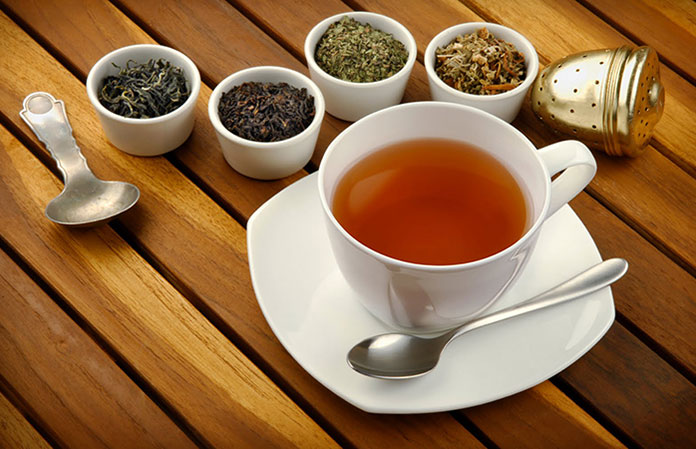Because of its prominence in the international market, it is likely that the majority of consumers are already well-acquainted with the natural benefits native to black tea.
However, the nature of the market for restorative tea lends itself to a guided skepticism—consumers are often left with very little information regarding the actual benefits surrounding teas, hot and cold.
Among these benefits posited by those at the top of the billion dollar industry, none are more important to the average tea drinker than the tea’s positive affect on cancer risks, Parkinson’s risks, as well as its potential as a curative supplement for diabetes and heart disease.
Table of Contents
One of the most prominent cultural differences in the world of tea has always been surrounding the way that we drink the tea. In the Eastern half of the world, black tea is often consumed hot and unedited. The cozy West, however, typically prefers their black tea iced, often consummated with milk, sweetener, and even a lemon wedge to dull the sharp natural taste of their tea.
In fact, some even enjoy their tea with alcohol, calling it an “Irish Breakfast!” However a drinker chooses to don their treat, the soft drink transcends preferences, offering its resounding benefits to consumers—no matter what the content of their black tea! Despite the benefits, however, some view the tea as a strong version of the beloved drink, far too overwhelming for everyday consumption.
The mysterious drink has undoubtedly sewn its way into the hearts of consumers all over the world, despite the growing group of detractors. Though it is not necessarily the top drink in the United States, Black tea is one of the prevailing drinks in countries like Sri Lanka and India, consumed by the millions of gallons each year by eager drinkers ready to absorb its amazing benefits.
In this guide, we will take a look at some of the main selling points for the increasingly popular international drink known as black tea. Because of its many facets of restorative, healing, and delicious powers, this guide will focus on some of the main positives, and negatives, that give black tea such an incredible worldwide reputation.
Seven Health Benefits Of Black Tea
In short, black tea happens to be the main cause of a multitude of health benefits relating to several key areas of the human physiology. In this section, we will outline a number—seven—of the most resoundingly scientifically hailed benefits native to black tea.
1. Boosts Heart Health
Several studies corroborate the view that black tea can seriously help the heart health and restoration of a consumer’s most important regulatory organ. In particular, a study conducted in 2017 found that the consumption of black tea can have a negating effect on the impacts and risks of a specific heart disease.
A varied study, this particular study surveyed the results on hundreds of thousands of men, finding a direct correlation between increased black tea consumption and a lowered risk for the proliferation of ischaemic heart disease. Additionally, the study found a link between the mysterious drink and a decreased risk of significant heart issues like a heart attack.
The results of this study are in no way the result of an isolated incident. An additional study from a few years back found that significant levels of black tea consumed on the daily decreased a number of cardiovascular risk factors.
An additional study compared black tea (without additives) consumers to hot water drinkers for a period of 12 weeks. The black tea contained elevated amounts of flavan-3-ols, flavonols, theaflavins and Gallic acid contents.
The researchers were able to conclude that regular and daily consumption of nine grams of the tea over the hot water led to “a highly significant decrease” of risk involving the cardiovascular system.
Including triglyceride levels and fasting serum glucose. In addition to that, there was a significant drop in the ratio of LDL to HDL cholesterol in addition to an increase in HDL (“healthy”) cholesterol levels.
All in all, the researchers determined that having black tea “within a typical diet” can bring to a decrease in the significant cardiovascular risk factors, and it also increases antioxidant levels

2. Cancer-Fighting Ability
The ability to help fight cancer is amongst other black tea benefits, because black tea consumption has been linked to the reduction of some cancer.
A 2013 publication in the American Journal of Epidemiology investigates the effects of drinking flavonoid-rich black tea on the risk cancers such as prostate cancer in over 58,000 men in the Netherlands who provided specific information on many cancer risk factors. Black tea has been considered a major source of healthy flavonoids such as myricetin, catechin, kaempferol, and epiatechin.
This study was also able to reveal that high level of flavonoid and black teal intake was connected to a lower risk of advanced stage prostate cancer, but no association were observed for earlier stages of prostate cancer. Another promising study released in 2016 exemplified how the theaflavin-3 found in black tea had an ability to halt the growth of cisplatin-resistant cancer cells.
An impressive finding since cisplatin is thought to be “one of the most effective broad-spectrum anticancer drugs.” Along with, the theaflavin-3 was less toxic to the healthy ovarian cancer cells, which is awesome since many conventional anticancer drugs kill both cancerous and good cells.
3. Decrease Diabetes Risk
Diabetes is an ever-growing extremely bad health problem all around the world. A recent study published in the journal Diabetologia wanted to look at consumption of coffee and tea in tandem with the development of type 2 diabetes. The study included 40,011 participants, and at the average follow-up period of 10 years, the researchers discovered that 918 of those tested had developed type 2 diabetes.
They also found that consuming both tea and coffee was connected with a lowered risk of type 2 diabetes. Specifically, consumption of three cups of coffee or tea per day also decreased the risk of type 2 diabetes by about 42 percent. This makes black tea beneficial as part of a diabetic diet plan.
4. Potentially Prevents Strokes
In an analysis published in 2009, it was found that drinking green tea or black tea may be able to prevent some strokes. The researchers discovered that no matter what country the test subjects originated from, the individuals who drank 3 or more cups of that tea per day were found to have an overall decrease of stroke by 21% as compared to some subjects who consumed less than a cup a day.
5. Relieving An Upset Stomach
While having diarrhea or experiencing an upset stomach, one strong cup of black team may be able to solve your dilemma. Black tea has tannins present that have a delightful astringent effect on the intestines. This can help decrease inflammation in the intestines and control your diarrhea. If dehydration is ever an issue, then decaffeinated black tea will be able to do just the trick.
One study in 2016 found that in patients 2-12 years old with nonbacterial, acute diarrhea, black tea in a tablet form was not only an effective way to combat the diarrhea, but it was also inexpensive and safe.
6. Fighting Bacteria
Not only is Black Tea a tasty beverage, but it can also have immense potential in terms of its antibacterial and antioxidant powers. Research determined that black tea’s phenolic compounds and some of its tannins are able to inhibit certain types of bacteria.
Along with that, the non-polymeric phenolic compounds can be absorbed by the gastrointestinal track. Black tea, when you add honey, has also been shown to kill H. pylori bacteria, which can stop all kinds of unwanted symptoms of a H. pylori, infection such as ulcers.
7. Lowers Stress Hormones
An important, yet often overlooked benefit is the fact that the amount of stress present can be decreased through consumption of teal.
While coffee is known for making some people too woke, tea has a certain perception for being a caffeine source and sometimes is referred to a relaxation drink that works well as a stress reliever. Studies have shown that tea can actually help its consumers recover from the daily stresses and annoyances of life lowering the amount of stress hormones you have.
In one publication, they found that 75 males with an average age of 33 who drank tea all were split into two groups. For a period of 6 weeks, one party received a fruit-flavored tea mixture while the other drank a beverage with the same level of caffeine, but no fruit flavor.
The people went under stressful situations like what everybody experiences in everyday life. The researchers analyzed stress hormones and blood pressure levels in addition to the stress level the subjects reported themselves and heart rates.
The study found that about 50 minutes after the stressful part occurred the group drinking the Black Tea without the fruit had a noticeable drop in cortisol levels compared to the group that had the fruit.
The plain black tea drinkers were more relaxed after the stress test was over. Blood platelet activation was also lower in the plain black tea group, so their risk of heart attack had dropped.
What Else Can Black Tea Be Good For?
These are a few doses of black tea by mouth that are known to be beneficial in research for the following health concerns:
- Mental fitness and headaches: up to 250 milligrams of caffeine a day can reduce headaches and help mental alertness
- Risk of heart attack or Kidney health: one cup of black tea each day to decrease heart attack and kidney stone risk
- Atherosclerosis: up to four cups of brewed black tea each day to prevent arteries from hardening
- Parkinson’s disease: Consuming 5-33 cups to tea a day seems to lower the risk of acquiring Parkinson’s for men, but if they drink as few as 1-3 cups then you have a significantly lower chance of getting the disease. In women the desired amount is 1-4 cups. I want to state that I certainly don’t advise having 33 cups of black tea each day. We all handle caffeine in different ways, but in general it’s not good to have more than five cups of black tea every day.
- Alzheimer’s disease: Recent research developed from studying 957 Chinese elderly 55 and up found that those who regularly consume black tea were at a reduced risk for acquiring Alzheimer’s, and those who already had the disease saw a significant reduction in the time it took the disease to progress any further.
Black tea may be one of the forefront treatments for Alzheimer’s disease in the near future.

Black Tea vs. Green Tea vs. White Tea
All forms of tea (Black tea, green tea, and white tea) all share the same origin, this source is none other than the tea plant. The creation and production of tea yields different results depending on what you want. These different colors all have various flavors and health benefits associated with them.
In terms of plant to consumer, white tea undergoes very little processing and it is the closest to actually consuming the leaves of the tea. Green tea comes next in terms of the amount of processing. It gets dried then gets steam-heated or fried in a pan. Finally, black tea undergoes in interesting process because it is just left out and allowed to decay after they pick it.
The antioxidant value of black tea is 1,128 (according to its ORAC score). Green tea clocks in just above it at 1,253. Green tea has more antioxidants, but not by much. Black, green and white tea all have common benefits thanks to their polyphenols, which research has shown to have antioxidant, antiviral, anti-inflammatory, detoxifying and immune system benefitting effects.
Green tea is usually lower in caffeine than black tea while green tea is typically lower than white tea. Science has discovered that white and green tea have about the same levels of health-promoting effects and polyphenols.
Black Tea Origin And Its Nutrition Facts
Black tea originates from a young leaves and occasionally the leaf buds of the main tea plant, Camellia silences. Green, black, and white tea all get their origins from this same tea plant. As mentioned earlier, black tea is left out after being picked so it more oxidized than all the other types of teas, and it is much stronger in flavor.
In terms of caffeine levels, black tea is found to be in possession of far higher caffeine levels when compared to the other types of teas.
The grades of black tea are how these plants are rated in terms of quality. The tea known as whole leaf black tea is the top grade because it has very little or possibly even no changes to the tea leaf.
They are sometimes called “orange pekoe” and this tea is further distinguished by how many leaves were picked with the leaf buds. Two, one, or no leaves were picked from the bud, and if none were picked then that is the highest quality of tea that you could possibly get.
The lowest level of the black tea is made up of broken leaves and the remaining dust. Typically, the black tea that is brewed out of bags is made from this level of tea leaves. This allows for the tea to be bred much faster and much stronger. Whole leaves are not as strong or harsh and they are much more ornate and floral.
Black tea is made from oxidized leaves no matter what, so the leaves were wilted. The oxidation of the black tea is what leads to the formation of thearubigins and theaflavins in the tea.
These compounds are great because of the fact that they are the origin of the color and taste of black tea, as well as its immense health benefits that were discussed previously.
One cup of brewed black tea has the following:
- 0.7 carbohydrates
- 0.5 milligrams manganese (26 percent DV)
- 2 calories
- 11.9 micrograms folate (3 percent DV)
The antioxidant (ORAC) score mentioned earlier is no small number either. Oxygen radical absorbance capacity is what ORAC stands for. This metric is used for measuring the levels of antioxidants of many foods and beverages. The National Institute of Health came up with this way of measuring health. The high oxidant contents are directly linked to its health benefits.
How to Make Black Tea
In order to maximize the benefits that can be accrued from black tea you should go for a black tea that is both loose leaf and organic. To stay away from pesticides it is also good to buy the organic variant of black tea. The bags should also be avoided if you wish to get the best quality. High water temperature is essential to all healthy black tea making. No dairy should be added if you wish to maintain the healthiest level.
A study by the International Journal of Food Sciences and Nutrition said that adding milk to black tea created a significant drop in its antioxidant potential, in particular full fat cow’s milk. Heating the water to near its boiling point also led to the highest level of health benefits.
How to brew loose leaf black tea:
Boil water in tea kettle. Using your cooking utensils of choice, add one to two tablespoons of black tea to 8 ounces or 12 ounces of just boiled 212 degrees F water (depending on how you like the strength your tea as well as your cup size).
Allow 4 minutes of steeping time. Serve in your favorite cup and drink up! Brewing can range significantly between different varieties of black tea so always read labels and directions carefully.
Black Tea Recipes
A nice cup of hot tea is one of the easiest ways to have a drastic impact on your health, but black tea in its cold, iced form also has health benefits. Another way to get the tea is in the form of the probiotic rich kombucha.
Other Ways To Try Black Tea:
- Black Tea Irish Porridge with Acai Berry (No. 8)
- Chai Tea Recipe
Black tea has many uses for cooking and eating, but I also want to know what natural beauty aid it can have as well. Here are a few non-food ways to make the most of black tea:
- Treat Canker Sores
- Natural Sunburn Relief
- Razor Burn

Black Tea History And Facts
Black tea is not a new thing. For many a millennia, tea has been drunken has a beverage. In the third century AD, experts say that tea began to be consumed every day, and this is when tea growing and processing started up.
The very first account of tea planting, processing and subsequent drinking is said to be from 350 AD. In the 1800s, tea started to spread further from China and Japan to Taiwan, Indonesia, Burma and India. In the mid-1800s, the British were bringing tea culture into India and Ceylon (present day Sri Lanka). Today, the top five growers of tea in the world are China (No. 1), India, Kenya, Sri Lanka and Turkey.
Tea has a long history, and it has endured so much. It is no wonder that the world’s second most popular beverage is mass produced all across the world. When you steep black tea, you essentially allow the flavor of the tea to infuse in the hot water. The more steep time, the stronger the flavor and.
Scientists say that you shouldn’t steep your black tea for less than two minutes, but research has shown that a whopping 80 percent of tea drinkers don’t wait for even that small amount of time.
Plus, 40 percent drink their tea right after putting the leaves in, which means they get a worse, less antioxidant-rich, weak brew. To get the most tea benefits, you definitely want to allow a good amount of steeping time.
Side Effects, Caution, and Medical Interactions
Is it ever bad for you? An overdose on caffeine is a risk that comes with drinking black tea, but it’s simple to avoid if you do not overdo it. It’s suggested that you should not have higher than five cups per day. More than that is pretty unsafe. You can also become dependent on the caffeine found in tea. (25) Black tea is definitely best in moderation for these reasons.
If you’re pregnant or even breastfeeding, drinking at or less than three cups of black tea is considered to be safe.
However, consuming more than this amount is possibly dangerous and has been associated with an increased risk of miscarriage, sudden infant death syndrome and other effects, including symptoms of caffeine withdrawal in newborns and other birth risks such as decreased newborn weight. If you have any ongoing health issues or take medication, talk with your doctor before drinking black tea. There are a many possible black tea medication interactions.
Black tea can lower the body’s ability to absorb of iron. If you do not have an iron deficiency, this is probably not a concern. However, if you are possibly concerned, it’s best to drink black tea in between meals rather than with the meals to lower the possible interaction.
Black tea may also interact with supplements, including bitter orange, cordyceps, magnesium, calcium, caffeine-containing supplements and herbs, danshen, creatine, echinacea, melatonin, and red clover and possibly other supplements.
That was not a complete list, but it covered some general and popular interactions. It’s possible to have an allergy to black tea. Testing can tell you if you have one. Stop drinking black tea if you show any signs of an allergy, especially if the redaction is severe.
Final Thoughts On Black Tea Benefits
So far, black tea has been proven by science to be quite impressive, because it can boost heart health, decreasing diabetes risk, fight cancer, and lower stress. Quality black tea in can definitely be a healthy addition to your diet. It’s also a fantastic option if you’re looking to decrease your coffee consumption.
By switching out a cup of coffee for a cup of black tea, you can still get the boost of mental alertness and with less caffeine. Everyone’s feelings and limits with caffeine are varied so be thoughtful of that when drinking black tea. You can also test and experiment with all of the varied flavors of black tea to decide which one best suits you best.
When you do have a cup of black tea, make it a relaxing time for yourself because that makes the black tea benefits even better.









